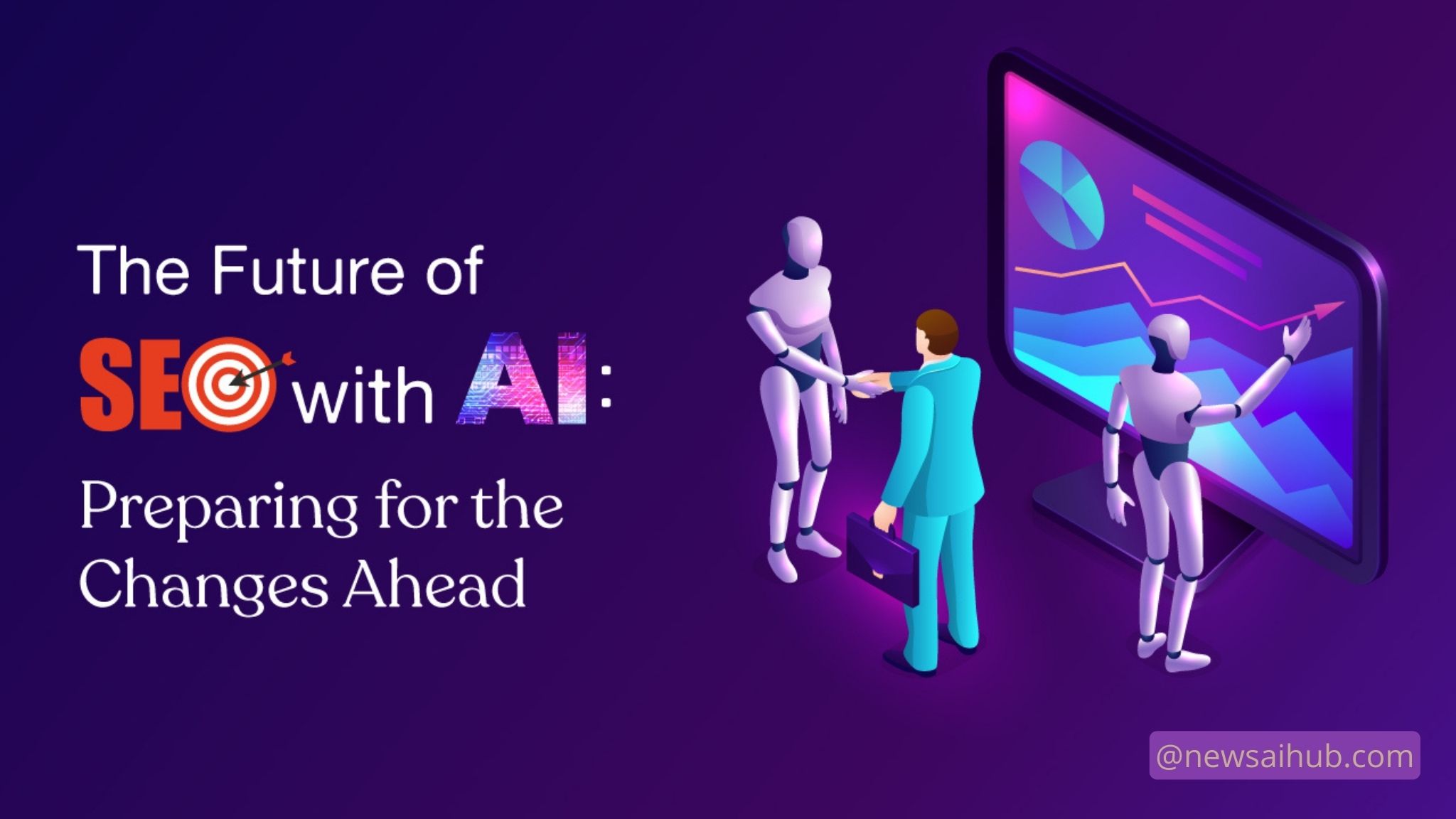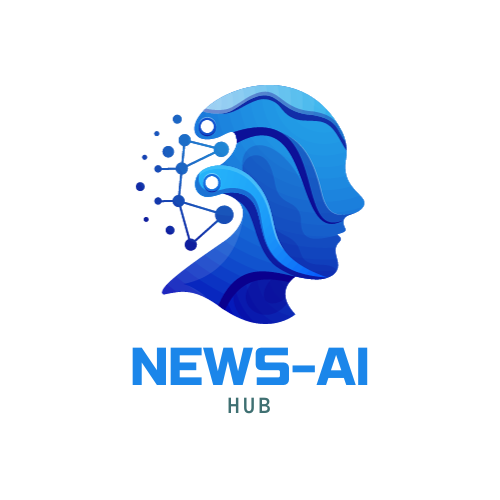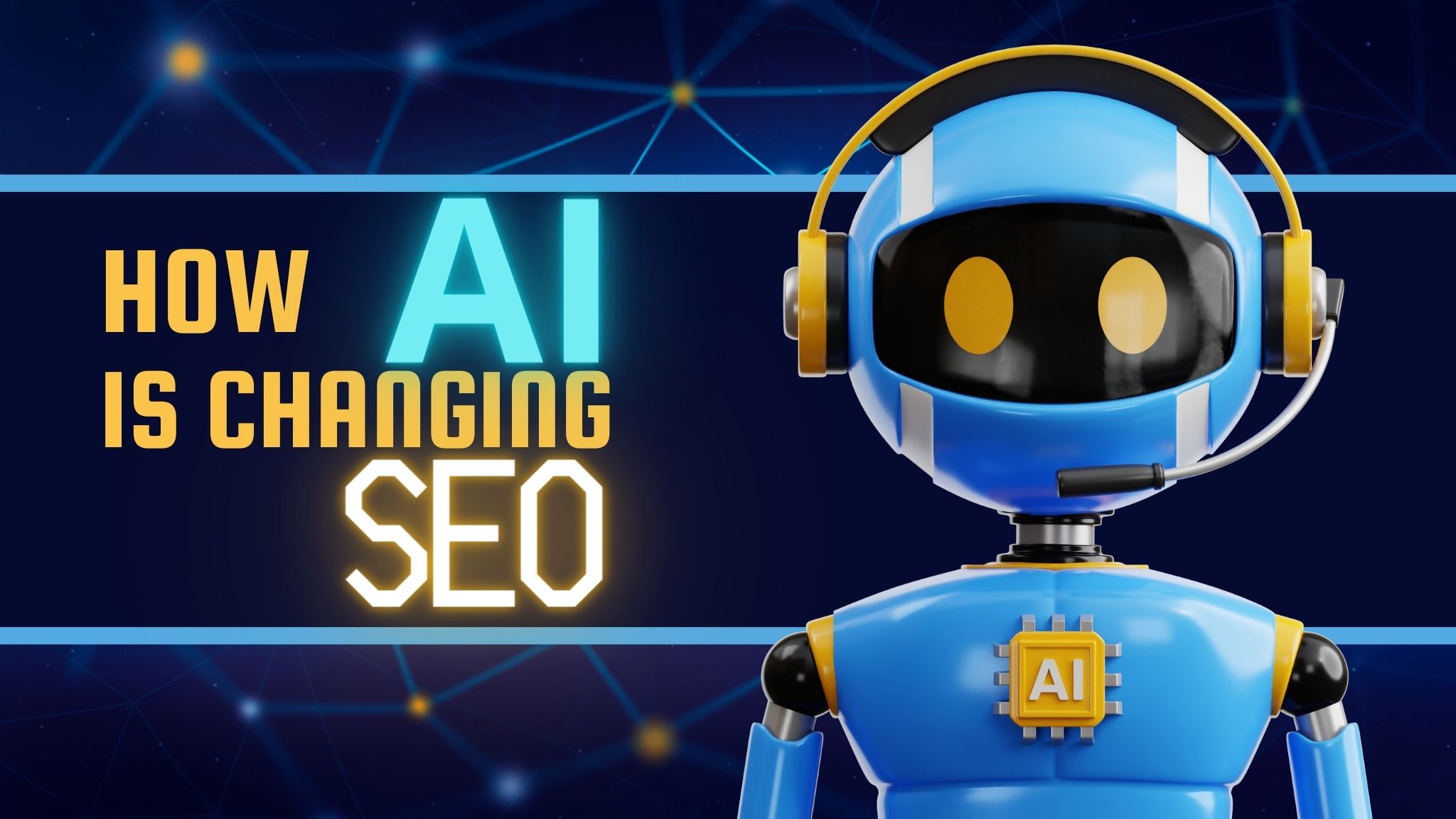How AI is changing SEO. Today, SEO is crucial for online success due to fierce competition. AI has transformed SEO, making it more efficient and personalized. Let’s discuss how AI is reshaping SEO and what it means for businesses and marketers.
Contents
- The Impact of AI on SEO Strategies
- AI-Powered Content Creation for SEO
- Automated Content Generation
- Personalized Content Recommendations
- Content Optimization
- The Role of AI in Keyword Research
- Identifying Long-Tail Keywords
- Understanding User Intent
- Monitoring Keyword Performance
- AI and the Future of Search Engine Rankings
- Emphasis on User Experience
- More Personalized Search Results
- Increased Use of Voice Search
- Challenges and Opportunities with AI in SEO
- Conclusion: Embracing AI for Successful SEO
The Impact of AI on SEO Strategies
AI mimics human intelligence in machines, involving learning, reasoning, and self-correction using algorithms and data. In SEO, AI analyzes data to make predictions and decisions, leading to more precise website optimization for search engines. Let’s explore how AI is changing traditional SEO strategies.
Automation of Repetitive Tasks
One of the most significant impacts of AI on SEO is the automation of repetitive tasks. Traditionally, SEO involved manual processes such as keyword research, content optimization, and link building. These tasks were time-consuming and required a lot of effort, making it challenging to keep up with the ever-changing search engine algorithms. However, with AI-powered tools, these tasks can now be automated, saving businesses and marketers valuable time and resources. For example, AI-based tools can analyze large volumes of data and identify relevant keywords and phrases to optimize content, eliminating the need for manual keyword research.
Personalization of Search Results

Another significant impact of AI on SEO is the personalization of search results. With the help of AI, search engines can now deliver more personalized and relevant results to users based on their search history, location, and preferences. This means that businesses and marketers need to focus on creating content that is tailored to their target audience’s interests and needs. AI-powered tools can analyze user behavior and preferences to help businesses understand their audience better and create targeted content that resonates with them.
The Rise of Voice Search
The increasing use of voice assistants such as Siri, Alexa, and Google Assistant has also been made possible by AI. Voice search is becoming increasingly popular, with more people using it to perform online searches. As a result, businesses and marketers need to optimize their content for voice search to ensure it appears in the top results. AI-based tools can help identify the most common voice search queries and optimize content accordingly, making it easier for businesses to rank higher in voice search results.
Enhanced User Experience

AI has greatly affected user experience (UX) and its role in SEO. Search engines prioritize UX when ranking websites, and AI has simplified the process of enhancing UX. For instance, AI-driven chatbots offer immediate and tailored responses to user queries, enhancing overall user experience. Moreover, AI can assess user behavior and suggest website enhancements, like page load speed, mobile responsiveness, and navigation. By improving UX, businesses can boost their search engine rankings and draw more organic traffic to their websites.
AI Tools for SEO Optimization

As mentioned earlier, AI has made it possible to automate many SEO tasks, making them more efficient and accurate. There are numerous AI-powered tools available in the market that can help businesses and marketers optimize their SEO strategies. Let’s take a look at some of the most popular AI tools for SEO optimization.
Google’s RankBrain

Google’s RankBrain is an AI algorithm that helps the search engine process and understand search queries better. It uses machine learning to analyze user behavior and improve the accuracy of search results. RankBrain is responsible for processing a significant portion of Google’s search queries, making it an essential tool for businesses and marketers to consider when optimizing their websites for search engines.
MarketMuse
MarketMuse is an AI-powered content optimization tool that helps businesses create high-quality and relevant content for their target audience. It uses natural language processing (NLP) to analyze content and identify gaps and opportunities for improvement. MarketMuse also provides recommendations for keywords, topics, and related content to help businesses create comprehensive and optimized content.
BrightEdge
BrightEdge is an AI-based SEO platform that offers a range of tools to help businesses improve their search engine rankings. It uses AI to analyze data from various sources, including search engines, social media, and web analytics, to provide insights and recommendations for SEO optimization. BrightEdge also offers features such as keyword research, content optimization, and competitive analysis to help businesses stay ahead in the ever-changing SEO landscape.
AI-Powered Content Creation for SEO
Content is king when it comes to SEO, and AI has made it easier to create high-quality and optimized content. With the help of AI, businesses can now generate content that resonates with their target audience and ranks well on search engines. Let’s explore how AI is changing the game when it comes to content creation for SEO.
Automated Content Generation
AI-powered tools can generate content automatically based on specific parameters set by businesses and marketers. This means that businesses can create large volumes of content quickly and efficiently, saving time and resources. However, it is essential to note that while AI-generated content may be useful for certain types of content, such as product descriptions or news articles, it may not be suitable for more complex and creative content.
Personalized Content Recommendations
AI can analyze user behavior and preferences to provide personalized content recommendations to businesses and marketers. This means that businesses can create content that is tailored to their target audience’s interests and needs, increasing the chances of it ranking well on search engines. Additionally, AI can also analyze user engagement with content and provide insights on how to improve it for better performance.
Content Optimization
AI-powered tools can also help optimize existing content for better search engine rankings. These tools use NLP to analyze content and identify areas for improvement, such as keyword usage, readability, and relevance. This means that businesses can ensure their content is optimized for SEO without having to spend hours manually analyzing and editing it.
The Role of AI in Keyword Research
Keyword research is a crucial aspect of SEO, and AI has made it more efficient and accurate. With the help of AI, businesses can identify the most relevant and high-performing keywords for their content, making it easier to rank higher on search engines. Let’s take a closer look at how AI is changing the game when it comes to keyword research.
Identifying Long-Tail Keywords
Long-tail keywords are longer and more specific phrases that users use when searching for something online. These keywords are essential for businesses to target as they have less competition and are more likely to attract highly targeted traffic. However, identifying long-tail keywords manually can be challenging and time-consuming. AI-powered tools can analyze vast amounts of data and identify long-tail keywords that are relevant to a business’s niche, making it easier to target them in content.
Understanding User Intent
User intent refers to the reason behind a user’s search query. Understanding user intent is crucial for businesses to create content that meets their audience’s needs and ranks well on search engines. AI can analyze user behavior and preferences to determine user intent and provide insights on the type of content that would best satisfy that intent. This means that businesses can create content that is more likely to rank well and attract organic traffic.
Monitoring Keyword Performance
AI-powered tools can also monitor keyword performance and provide insights on how to improve it. These tools can analyze data from various sources, such as search engines and social media, to determine which keywords are performing well and which ones need improvement. This means that businesses can continuously optimize their content for better search engine rankings.
AI and the Future of Search Engine Rankings
The rise of AI has had a significant impact on search engine rankings, and this trend is only expected to continue in the future. As AI technology advances, we can expect to see even more changes in the way search engines rank websites. Let’s explore some of the ways AI is shaping the future of search engine rankings.
Emphasis on User Experience
As mentioned earlier, AI has made it easier to improve user experience, and search engines are placing a higher emphasis on UX when ranking websites. In the future, we can expect to see even more focus on UX, with AI playing a crucial role in analyzing and improving it. This means that businesses will need to prioritize UX in their SEO strategies to stay ahead of the competition.
More Personalized Search Results
With the help of AI, search engines can now deliver more personalized and relevant results to users. In the future, we can expect to see even more personalized search results based on factors such as location, search history, and preferences. This means that businesses will need to create highly targeted and personalized content to rank well on search engines.
Increased Use of Voice Search
Voice search is becoming increasingly popular, and AI is making it possible. In the future, we can expect to see even more people using voice assistants to perform online searches. This means that businesses will need to optimize their content for voice search to ensure it appears in the top results. Additionally, we may also see the rise of voice-based advertising, creating new opportunities for businesses to reach their target audience.
Challenges and Opportunities with AI in SEO
While AI has brought about many positive changes in the world of SEO, it also presents some challenges and opportunities for businesses and marketers. Let’s explore some of these challenges and opportunities.
Data Privacy and Security
One of the main concerns with AI is data privacy and security. As AI relies on vast amounts of data to function, there is a risk of sensitive information being compromised. Businesses and marketers need to ensure that they are using AI ethically and responsibly, and taking necessary measures to protect user data.
Cost and Accessibility
AI-powered tools and technology can be expensive, making it challenging for small businesses and marketers to access them. However, as AI technology advances, we can expect to see more affordable and accessible options in the market, creating new opportunities for businesses of all sizes.
Keeping Up with Changes
The ever-changing nature of AI means that businesses and marketers need to stay updated with the latest developments and trends. This can be challenging, especially for those who are not familiar with AI technology. However, by staying informed and continuously learning, businesses and marketers can take advantage of the opportunities that AI presents.
Conclusion: Embracing AI for Successful SEO
In summary, AI has greatly influenced SEO, enhancing its efficiency, effectiveness, and personalization. Through AI-powered tools, businesses and marketers can refine their SEO tactics, produce top-notch, pertinent content, and engage their desired audience in a more precise and personalized way. Despite the obstacles associated with AI, its potential cannot be overlooked. Hence, it’s crucial for businesses and marketers to adopt AI and leverage its capabilities to remain competitive in the constantly evolving digital realm.
–> Back to Home

